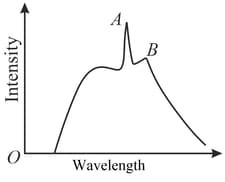Characteristic and Continuous X-Rays
Characteristic and Continuous X-Rays: Overview
This Topic covers sub-topics such as Characteristic X-rays, Continuous X-rays, Mode of Production of Continuous X-rays, Mode of Production of Characteristic X-rays and, Cut off Wavelength of Continuous X-ray
Important Questions on Characteristic and Continuous X-Rays
A potential difference of is applied across an X-ray tube. The minimum wavelength of X-rays generated is
The wavelength of the characteristic X-ray line emitted by a hydrogen like element is 0.32 Å. The wavelength of the line emitted by the same element will be___________.
To produce characteristic X-rays using a Tungsten target in an X-ray generator, the accelerating voltage should be greater than ______ volts and the energy of the characteristic radiation is ______
(The binding energy of the innermost electron in Tungsten is ).
Electrons with de-Broglie wavelength fall on the target in an X-ray tube. The cut-off wavelength of the emitted X-rays is
Electrons of mass with de Broglie wavelength fall on the target in an -ray tube. The cut-off wavelength of the emitted -ray is
The speed of the colliding electron is increased in an -ray tube, then
In a coolidge tube, the potential difference used to accelerate the electrons is increased from to As a result the difference between and increases three fold. The wavelength of line is -
According to Mosley's law of characteristic ray. Which of the following is correct?
If the operating potential of an -ray tube is the velocity of -rays coming out of it is
In an x-ray tube, for an operating voltage, the cut off wavelength is . If operating voltage is slightly increased by then choose correct statement:
Consider a photon of continuous -ray and a photon of characteristics -ray of the same wavelength. Which of the following is different for the two photons?
-rays are produced in an -ray tube operating at a given accelerating voltage. The wavelength of the continuous -rays has values from :-
If the potential difference applied across a coolidge tube is increased, then:-
In -ray tube, when the accelerating voltage is halved, what will be the difference between the wavelength of line and continuous -ray spectrum's minimum wavelength ?
Let the voltage applied to an -ray tube be increased times and the minimum wavelength of an -ray continuous spectrum shift by . What will be the initial voltage applied to the tube?
What does sharp peaks and donates in the given figure representing the observed intensity of -rays emitted by an -ray tube as a function of wavelength.

What should be the wavelength (in ) of X-ray used for getting the first order Bragg reflection at a glancing angle of for a crystal having a distance of between its two parallel planes? (Consider)
Cut-off wavelength that is the minimum wave length of the X-rays produced in an X-ray tube is:
In the context of X-rays generated from an X-ray tube, which amongst the following statements is not correct?
If is minimum wavelength produced in X-ray tube when (Nickel) is the target material used and is the wavelength of line. If we increase the operating tube voltage and (Calcium) is used as a target material in place of , then the difference will:
